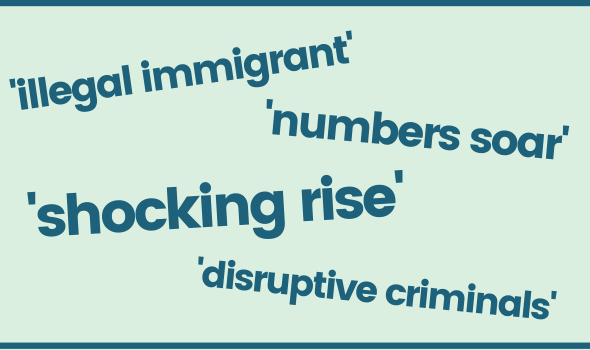Has Covid-19 altered media coverage of immigration?
Has Covid-19 altered media coverage of immigration?

The British press is notably hostile in its coverage of immigration. Between 2010 and 2016, the Daily Express ran a staggering 179 front pages devoted to anti-migrant stories, with the Daily Mail publishing 122 over the same period.
Yet as the nation has come together during the fight against Covid-19, the immense contributions that migrants make to society have become impossible to deny. It is therefore important to examine whether media coverage has changed accordingly, or whether the negative rhetoric is still just as present.
Coverage prior to the pandemic
Prior to the UK outbreak of Covid-19, print media coverage of immigration was characterised by derision, suspicion and venom. There was a calculated attempt to emphasise the supposed criminality of migrants, as evidenced by this Sun headline from 2 January 2020:
‘MIGRANT CRISIS: Priti Patel wants to deport illegal immigrants crossing channel faster after numbers soar in run up to Brexit’
The word ‘immigrants’ sits directly beside the word ‘illegal’, adding fuel to the widely-circulated falsehood that the majority of migrants have no legal right to be in the UK. This fixation on illegality and criminality is a recurring theme. Research from the Migration Observatory found the word ‘illegal’ to be the most common descriptor for the word ‘immigrants’, appearing in 10% of mid-market stories (titles include the Mail and Express), 6.6% of tabloid stories (including The Sun and the Mirror) and 5% of broadsheet stories (including The Times, The Telegraph, The Guardian).
The above headline also deliberately draws attention to the number of migrants entering the UK, evidenced through its evocative use of the verb ‘soar’ – this creates the illusion that the country is being overwhelmed. A fixation on numbers has also been pinpointed in previous research, with words such as ‘million’ and ‘thousands’ frequently appearing beside ‘immigrants’ across all newspaper types.
In short, pre-pandemic coverage of immigration was built upon an ‘us versus them’ mentality that sought to portray migrants as a threat to society.
Has coverage changed?
The key question concerns whether or not coverage has changed in light of the extraordinary events that have unfolded in recent months. A quick glance at the archives of either the Daily Mail or Daily Express reveals that, regrettably, much of the vitriol is still present, as evidenced by this Daily Mail headline from 4 July 2020:
‘How it can take EIGHT guards to escort one prisoner on a deportation flight from Britain: Figures reveal shocking rise in number of taxpayer-funded staff it takes to remove disruptive criminals and illegal immigrants’
The 'villain' frame is used emphatically here – not only does the aforementioned ‘illegal immigrants’ collocation appear, but the direct use of ‘criminals’ is designed to stoke fear. Further to this, the use of ‘disruptive’ reinforces the notion that migrants are a burden on the UK and fail to adhere to the rule of law.
This skewed and sensationalist presentation of events is completely devoid of empathy and balance – the desperate and often unjust circumstances surrounding deportation are completely excluded from the narrative, leaving the reader with the impression that immigration and criminality go hand in hand. On the basis of this evidence, the ‘all in this together’ spirit that has been fostered in recent weeks has been no match for the longstanding and deeply ingrained prejudices of the British press.
Having said this, headlines such as the following – published in the Daily Mail on 24 March – suggest that the pandemic has shone a spotlight on the harrowing situations that some migrants face:
‘Greece is at risk of coronavirus deaths spiking due to migrant camps where 42,000 people are packed into facilities designed for 6,000, making social distancing impossible’
Overcrowded conditions are immensely newsworthy due to the bearing they have on Covid-19 transmission. The severity of the situation at the Greek refugee camps has made it impossible to portray migrants as villains, and has in fact shown that they are victims of a cruel and unjust system. With this in mind, the pandemic appears to have increased the need for truthful, accurate reporting, making it difficult to maintain a consistently negative approach to immigration.
Whilst this can be seen as a positive development, it should not be interpreted as a sign of genuine and lasting change. Recent months may have shaken up the discourse somewhat, but ultimately the antipathy towards migrants can still be observed.
Cameron Boyle is a political correspondent for the Immigration Advice Service, an organisation of immigration solicitors.


